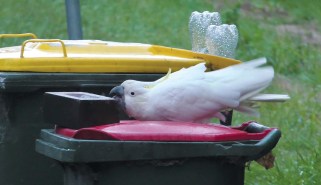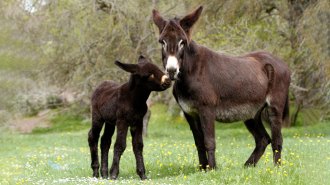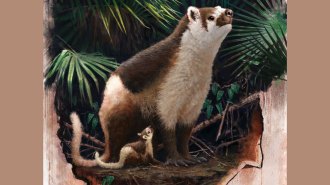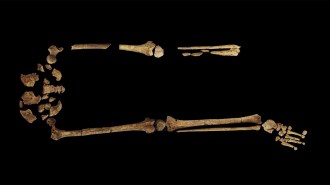Uncategorized
-
 Animals
AnimalsNeed to keep cockatoos out of your trash? Try bricks, sticks or shoes
In Sydney, humans may be in an escalating arms race with cockatoos. People are trying new tools to keep the pesky parrots out of their trash.
-
 Health & Medicine
Health & MedicineHow living in a pandemic distorts our sense of time
The pandemic has distorted people’s perception of time. That could have implications for collective well-being.
By Sujata Gupta -
 Genetics
GeneticsCan’t comb your kid’s hair? This gene may be to blame
Scientists linked variants of one hair shaft gene to most of the uncombable hair syndrome cases they tested.
By Meghan Rosen -
 Chemistry
ChemistryWhy once-gold ceilings in Spain’s Alhambra palace have purple stains
Moisture infiltrated flawed gilding at the iconic palace, leading to corrosion that deposited gold nanoparticles of the right size to appear purple.
By Carmen Drahl -
 Climate
ClimateHow to make recyclable plastics out of CO2 to slow climate change
Companies are turning atmospheric CO2 from smokestacks and landfills into plastics to shrink their carbon footprint.
-
 Climate
ClimateA carbon footprint life cycle assessment can cut down on greenwashing
As companies try to reduce their carbon footprint, many are doing life cycle assessments to quantify the full carbon cost of their products.
-
 Animals
AnimalsDNA reveals donkeys were domesticated 7,000 years ago in East Africa
When and where donkeys were domesticated has been a long-standing mystery. DNA now reveals they were tamed much earlier than horses.
By Freda Kreier -
 Neuroscience
NeuroscienceAn AI can decode speech from brain activity with surprising accuracy
Developed by Facebook’s parent company, Meta, the AI could eventually be used to help people who can’t communicate through speech, typing or gestures.
-
 Health & Medicine
Health & MedicineHow the COVID-19 pandemic may leave a long-term imprint on our health
As much as we want to put the pandemic in the rearview mirror, the coronavirus’s impact will remain a feature of many tomorrows.
-

-
 Paleontology
PaleontologyLiving fast may have helped mammals like ‘ManBearPig’ dominate
Staying in the womb for a while but being born ready to rock may have helped post-dinosaur mammals take over the planet.
-
 Anthropology
AnthropologyThe oldest known surgical amputation occurred 31,000 years ago
A young adult on the island of Borneo survived a lower left leg removal thanks to medically savvy rainforest surgeons.
By Bruce Bower